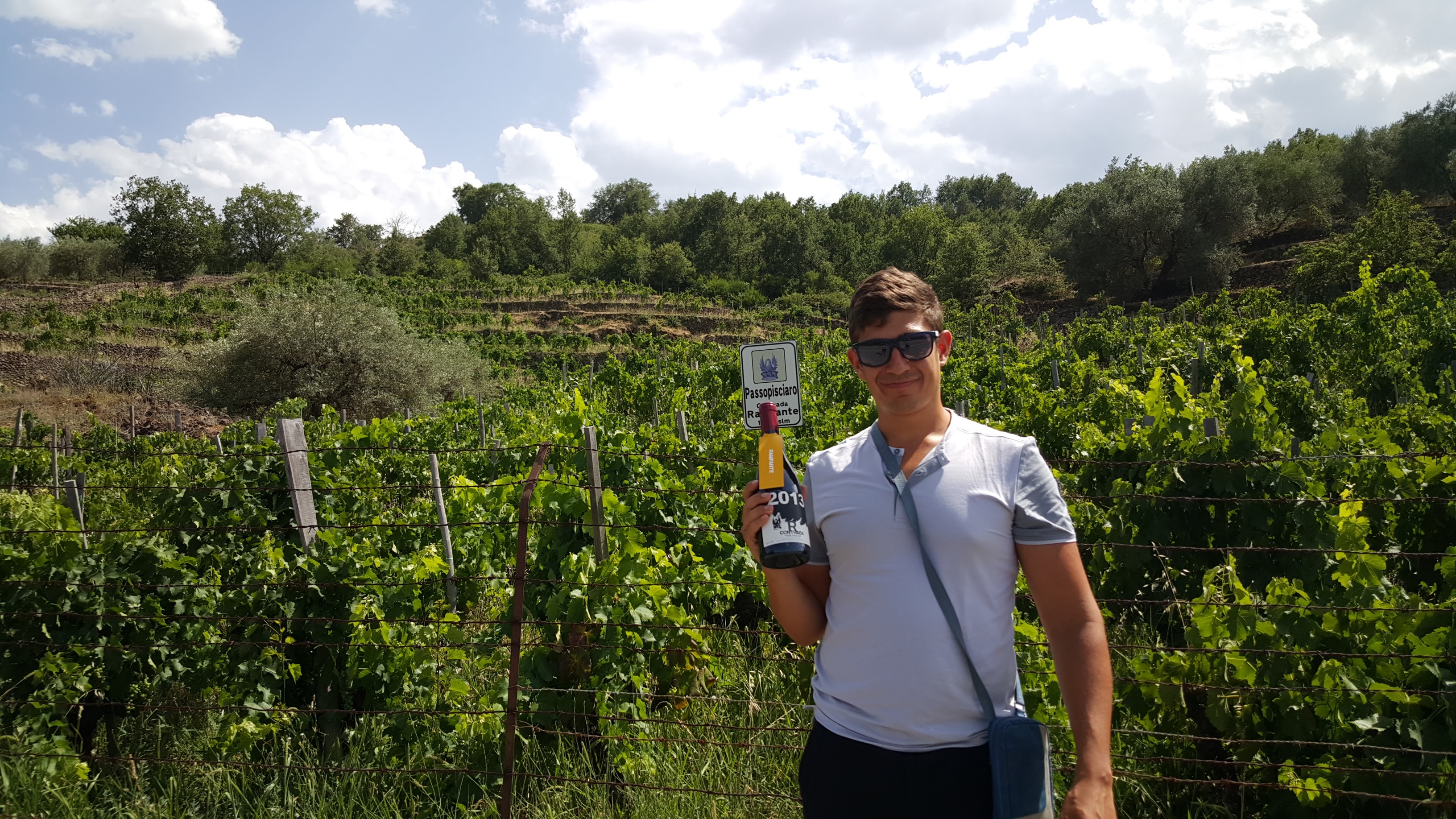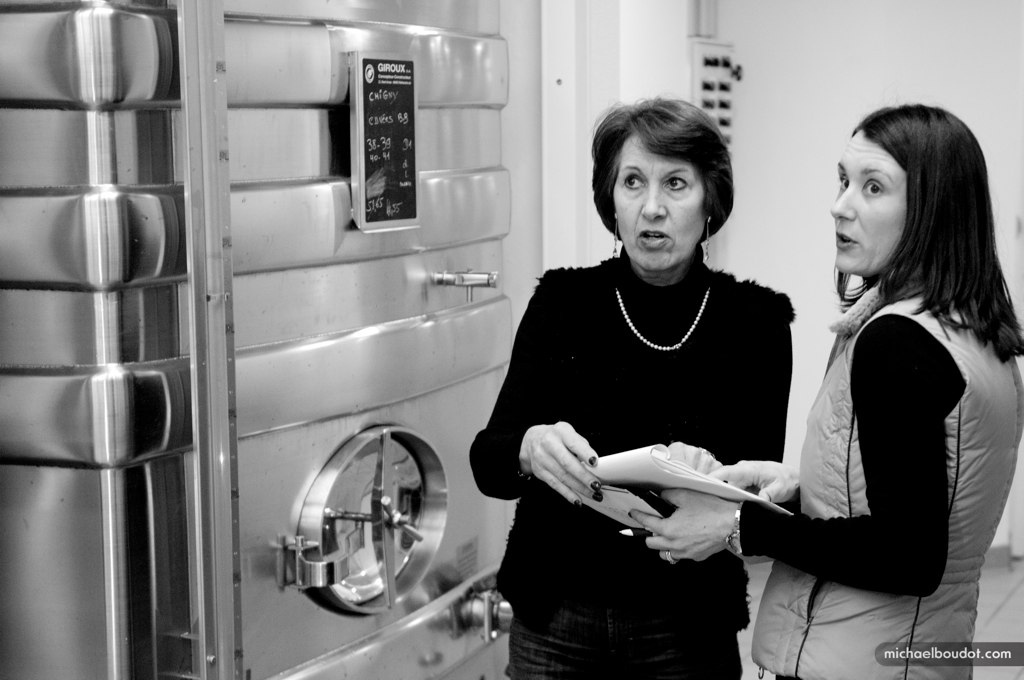
Grower Champagne is about respect for tradition, commemorating terroir, and demonstration of grace. Of course, grower Champagne is sparkling wine made in the Champagne region of France, like other types of Champagne. But the way grapes are grown, vinified, and cared for is a world apart.
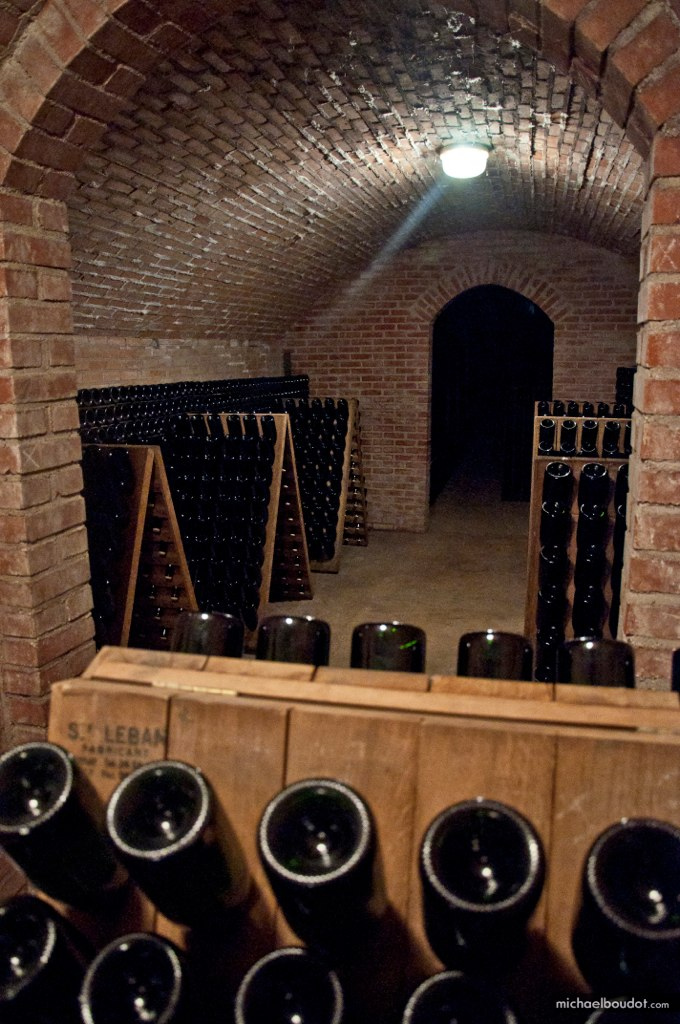
Grower Champagne is produced by ‘vignerons,' or families that actually grow grapes for winemaking. Conversely, ‘Maisons,' aka large Champagne Houses, such as Moët, Veuve Clicquot, Perrier, Bollinger, and much of those you see in the U.S., buy their grapes throughout the entire Champagne region (sometimes from as many as 1,000 vineyards). Vignerons rely on ancestral techniques to make terroir-driven wines, whereas Maisons do their best to replicate a consistent product for commercial aspirations. Moët, for instance, is owned by Louis Vuitton, marketed as a premier brand, and available in nearly every wine store. When their customers pop open a bottle, they expect a certain taste of luxury that is nothing short of perfection. “Perfection," in this case, is measured in terms of equality to prior years. Maisons achieve annual consistency by blending grapes from various appellations and vintages. Grower Champagne, on the other hand, aims for something much more stylistically radical.
Grower Champagne are producers who can be thought of as artisanal renegades. Out of the 16,000 growers in Champagne, only about 4,000 make their own wine. Those growers who are not granted the opportunity to be winemakers modestly sell their grapes. The remaining trailblazers produce a wide range of captivating wines beyond what you get from the popular Maisons (e.g. only a non-vintage blend, a vintage-dated blend, and a rosé). That being said, grower Champagne may be derived from a single varietal, cuvée, particular vintage, biodynamic technique, distinct method of fermentation, minimal dose of residual sugar, process of oak aging, etc. Best of all, these details are often liberally printed on labels or available on the growers’ websites. Such diversity is the delight of the modern day wine-o.
Coupled with a signature style, grower Champagne tends to be produced from grapes of specific parcels of land within a single village. The result is a Champagne that is distinct and different from year to year, as are most terroir-driven wines, and consequently, an expression that is simply unparalleled. One can easily identify grower Champagne by looking for an “RM” (Récoltant-Manipulant) in small print on the label.
While excitement is growing in export markets, independent winemakers from Champagne are not a new phenomenon. Grower Champagne has been around for decades, and only lately has it received commercial attention. As Jancis Robinson recently pointed out, Champagne is in a similar position as Burgundy was 20 years ago – “from being dominated by négociants [wine merchants who buys grapes from growers] to the pre-eminence of individual domains." Indeed, the tide is turning. Only about 5% of grower Champagnes reach the U.S., but that number has been steadily increasing. A diversity of approaches among vignerons has consumers realizing that the possibilities of Champagne are much more than we have known.
But let us be clear: this is not “out with the old, in with the new” reasoning. The winemaking techniques championed by vignerons are firmly grounded in years of family custom and appreciation of terroir. Conventional standards imposed by négociants have limited the opportunity of independence. In the face of uncertainty, grower Champagne should be applauded for its poise and sense of self.
--
Grape Collective talks to Angéline Templier from Champagne J. Lassalle:
Christopher Barnes: Angéline, how long have you been making wine?
Angéline Templier: It has been this year, 10 years. I joined the family domain in '05. My first harvest was '05. Starting the story, continuing the story.
How long has the family been making Champagne?
My grandfather started the story in 1942, but having a small vineyard, he started with just working in the land, and then the winemaking began in the mid '50s.
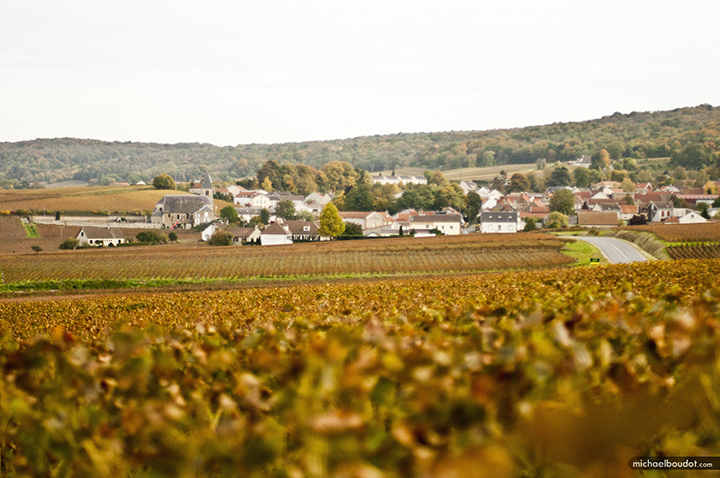
You were one of the first real grower Champagnes that came on the market in the United States.
Yes, it is pretty interesting because the first meeting was with my grandfather Jules and the importer Kermit Lynch. They made an appointment one day and the relationship has continued for more than 35 years.
It is great because we can see a nice partnership.
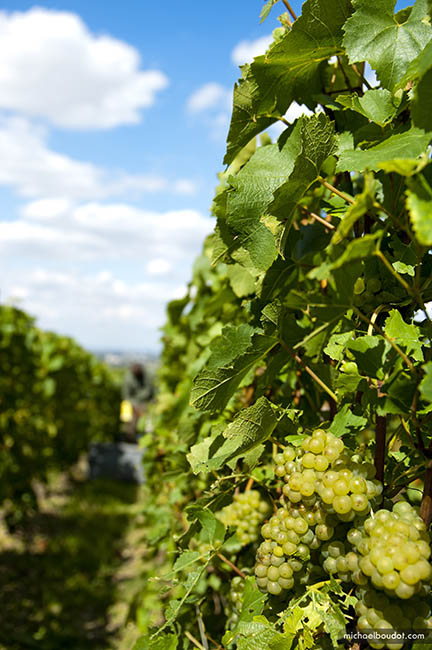
How did Kermit Lynch get involved with you? How did he pick your family estate?
He had a crush on the wines.
That is always the best way, right?
Yes. This is the feeling of Kermit I think for choosing the producer. We were his selection and we continue running in the same way.
Where in Champagne are you located?
From the beginning, we have been located in one of the three biggest parts of Champagne, in Montagne de Reims and in Chigny-Les-Roses. We are in this area and it's pretty interesting because we have chalky soil, argillic soils and we can play with the cépage depending on the different soils we have. Most of the vineyards we own now were planted by my grandfather so I am not changing what he started because for me it is very important to continue the styles that we've had since the beginning. We are working mainly with the three cépage of course but mainly with the Meunier cépage which was the choice he made in this terroir of Chigny-Les-Roses.
You are the third generation of female winemakers at the estate.
Correct.
That is really unique, right?
It is. We mention that frequently each time that we have a chance to talk with journalists because finally as a family grower I consider that we are not so much, so of course I would say that I am the one who is really involved in the operational task but I like to decide all blends with my mother who is still really involved in the business. My grandmother, she is turning 96 and she has the memory of sowing the wine. You don't have to be selfish. When you are winemaker, you need to listen to what was made and also in the fields how it was grown.
How do you feel the wines are different, if at all, in the fact that there is a female sensibility in the making of the wines?
We are in the middle ... Respecting a certain philosophy so staying an artisanal grower in the pure tradition and we have this side of the feminine. We don't like to say, "We are obviously female." We just mention it because we have a big sense of details. We like for example, some wines we like to have an approach with delicateness and this is maybe a kind of feminine style. I am so close to what was made more than 50 years ago. Then I would not say we are only on this feminine side.
How has the winemaking evolved over time at the estate?
We mostly evolve when we worked together with my mother. She continued running the business as exactly the same way my grandfather did but when I arrived 10 years ago, we had this idea to use this patrimony but also invest in different materials, I mean new press, stainless steel tanks, just for being more precise. One more thing is that we have an attitude of working the vineyard very traditionally with tractors because of course we don't use herbicide. We have natural approach of the vineyard. So we evolve but we keep the tradition on.
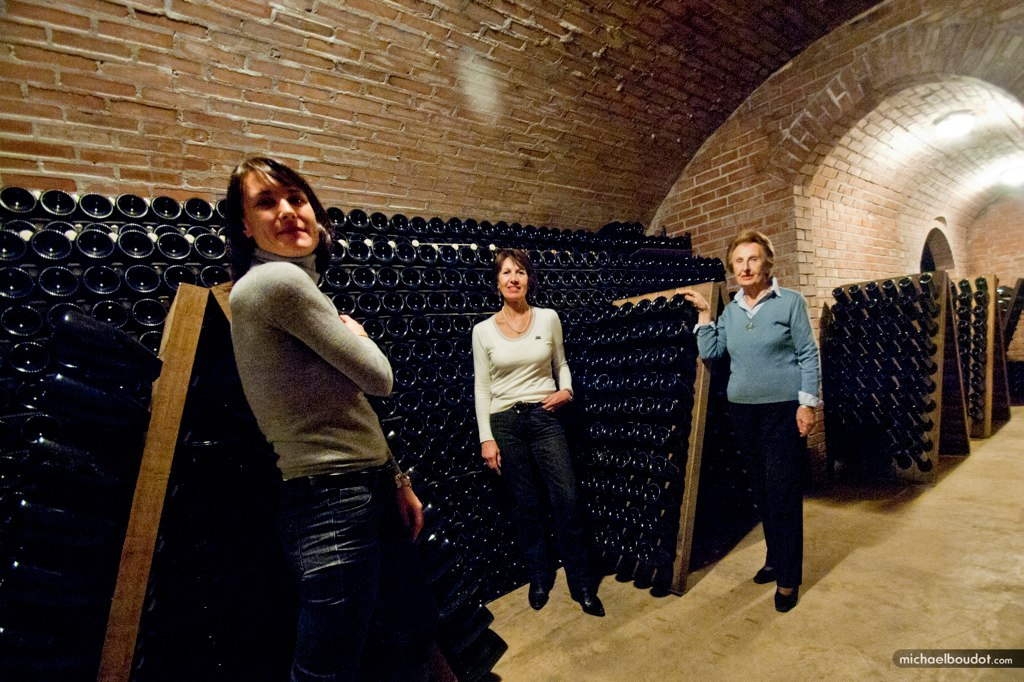
Three generations of Lassalle (L to R) Angéline Templier, Chantal Decelle-Lassalle, Olga Lassalle
A lot of people who are not deeply into wine, when they think of Champagne they think of Veuve Cliquot or Moet or one of the big houses.
Of course.
How is grower Champagne different from those types of wines?
The grower Champagne is so different right now because for certain people I would say you buy a brand, you just want to have a reference. When you are a grower Champagne you just want to have another approach. You want to understand the winemaker. You want to discover a vineyard. Some terroir. We are talking more and more about the terroir in Champagne which is we are a bit late when compared to some of the other regions of wine, so we are now talking about terroir, we are talking about family stories. People are interested to understand the feeling they have when they are tasting the wine. Their approach now is really far from the big brands I would say.
With the big brands, a lot of it is about a consistent style. Year in and year out Veuve tastes like Veuve. How is the variation from year to year with grower Champagne?
We have this variation. On the non vintage we have the same way of making the vintage. We also have a test, a personal identity that is on two main cuvée, the two non vintage cuvée. Finally we are not so far from this time of the big brands when they just blend different vineyard or different cépage. We also have this recipe, a main recipe for us.
Does the blend change at all from year to year?
I would say no for the main non vintage cuvée. For the rosé, it can occur because we are on the wine that we would like to keep a certain delicateness. We blend our rosé with the white and the red method. I am doing the vinification in red myself. Depending on the red grapes, depending the year we can just move it a little percentage of the blend just because we really want to focus on the test. Maybe it is the feminine side. Something that will be really light and we don't want to be influenced only by the grapes and we can move sometimes a little percentage.

What are your influences as a winemaker?
I would say that I keep going with the way of making wine, as much as we can do, be very close from the vineyard trying to be in a way that maybe a lot of birds did not go since the wine because we did not take so much about vineyard and make treatments pretty frequently before the disease appear. In that way I would say that we are very conscious. I am really respectful about this heritage. In the wine I would say being as natural we can, I have my touch about this side.
In terms of the terroir, how would you describe the climate and the soils?
The soils as I told you is a representation of argillic soils, calcareous soils,and chalky soils. That is pretty nice for our region which is famous for the Pinot Noir but where we are located in the specific village in terroir Chigny-les-Roses with three different types of soils so that would say it is nice for choosing the different cépage we want to use. We are in big landscapes with continued course so which is great. Finally we have a very nice scent from Herny in the morning to late in the afternoon. That gives us big opportunity for picking the grapes with a nice maturity. When it is harvest, the reason certain cuvées we are using the original parcels because we exactly know the maturity we can have with different parcels.
You age on the lees for a long time. What does aging on the lees do?
So we have this particularity on our domain to have a philosophy of aging very long time. We just realized a long time ago that this gives a finesse to our wines so this is our kind of secret. For a non vintage in Champagne I remind you that it is 15 months after bottling and three years for a vintage. First the aging process is something that we need to be really patient. We are aging for 48 months a minimum for the non vintage and for the vintage, for the small cuvées it depends on the year of harvest but mostly between six to ten years on lees.
---
More article about Champagne from Grape Collective:
https://grapecollective.com/articles/champs-101-the-basics-on-bubbly
https://grapecollective.com/articles/understanding-champagne-labels
https://grapecollective.com/articles/investing-our-hearts-in-champagne
Pre-order Grape Collective contributor David White's new book on Amazon But First, Champagne: A Modern Guide to the World’s Favorite Wine.
